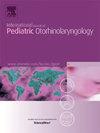Optimizing topical nasal steroid application in adenoid hypertrophy: A computational fluid dynamics (CFD) analysis
IF 1.2
4区 医学
Q3 OTORHINOLARYNGOLOGY
International journal of pediatric otorhinolaryngology
Pub Date : 2025-01-01
DOI:10.1016/j.ijporl.2024.112205
引用次数: 0
Abstract
Introduction
Intranasal steroids are effective in managing adenoid hypertrophy in children, but the evidence regarding technique of use for optimal results is lacking.
Methods
CFD analysis, with discrete phase modelling was done to simulate nasal spray in nasal cavity and drug delivery in the region of adenoids. The findings were validated using a 3D model designed from CT scan of the same region.
Results
Our study shows that the maximum spray deposition in the adenoid region is with injection angle of 30° with the concentration value of 14 kg/m3.
Discussion
Nasal steroids have been found to be quite effective in symptoms reduction in children with adenoid hypertrophy. The current guidelines for technique of application are similar to that which has been validated for nasal pathologies. But the studies analyzing optimum drug delivery to the adenoids with variations in technique of application are lacking. This is the research gap we have tried to fill with our study.
Conclusion
The application of nasal steroids with nozzle inclined at 30° with respect to the floor of nose ensures maximum drug delivery to the adenoids and is likely to improve the efficacy of this treatment.
优化局部鼻腔类固醇治疗腺样体肥大:计算流体动力学(CFD)分析。
鼻内类固醇治疗儿童腺样体肥大是有效的,但关于使用技术的最佳结果缺乏证据。方法:采用离散相模型,采用CFD分析方法,模拟鼻腔喷雾和腺样体区域给药过程。利用同一区域的CT扫描设计的3D模型验证了这一发现。结果:我们的研究表明,腺样体区域最大的喷雾沉积是在注射角为30°时,浓度值为14 kg/m3。讨论:鼻类固醇已被发现对减轻儿童腺样体肥大的症状相当有效。目前的应用技术指南与已经验证的鼻病理指南相似。但是,在不同的给药技术条件下,对腺样体的最佳给药效果进行分析的研究还很缺乏。这是我们试图用我们的研究来填补的研究空白。结论:鼻甾体喷口相对于鼻底倾斜30°时使用鼻甾体喷口可最大限度地将药物输送到腺样体,有可能提高治疗效果。
本文章由计算机程序翻译,如有差异,请以英文原文为准。
求助全文
约1分钟内获得全文
求助全文
来源期刊
CiteScore
3.20
自引率
6.70%
发文量
276
审稿时长
62 days
期刊介绍:
The purpose of the International Journal of Pediatric Otorhinolaryngology is to concentrate and disseminate information concerning prevention, cure and care of otorhinolaryngological disorders in infants and children due to developmental, degenerative, infectious, neoplastic, traumatic, social, psychiatric and economic causes. The Journal provides a medium for clinical and basic contributions in all of the areas of pediatric otorhinolaryngology. This includes medical and surgical otology, bronchoesophagology, laryngology, rhinology, diseases of the head and neck, and disorders of communication, including voice, speech and language disorders.

 求助内容:
求助内容: 应助结果提醒方式:
应助结果提醒方式:


